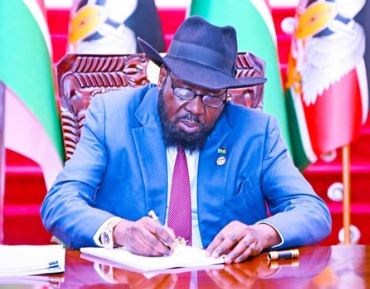The Resident Representative of the United Nations Development Programme (UNDP) in South Sudan. Dr. Mohamad Abchir, on Monday, extended his congratulations to the Government of South Sudan, including the Ministry of Justice and Constitutional Affairs, the National Legislative Assembly, and all relevant government agencies, on the historic assent of two crucial laws related to transitional justice.
In a statement following the enactment of the Commission on Truth, Reconciliation, and Healing (CTRH) and the Compensation and Reparations Authority (CRA) laws by President Salva Kiir Mayardit, Dr. Abchir hailed this as a significant milestone in the implementation of the Revitalized Agreement on the Resolution of the Conflict in South Sudan (R-ARCSS).
He emphasized the importance of sustaining momentum in establishing the two transitional justice mechanisms, which are critical to the country’s healing and peacebuilding process.
“This is an important milestone in the implementation of the R-ARCSS and the establishment of the two transitional justice mechanisms whose momentum needs to be maintained,” Dr. Abchir said.
The CTRH and CRA are designed to address past human rights violations and provide reparations to victims of the South Sudanese conflict, playing a key role in the country’s ongoing transition to peace.
For his part, Gabriel Isaac Awow, Undersecretary at the Ministry of Justice and Constitutional Affairs, also expressed his gratitude to the UNDP for its continued support of South Sudan’s judicial reform process.
“On behalf of the government of South Sudan and the Ministry of Justice, I would like to congratulate the people of South Sudan,” he stated. “The two laws have now been enacted, and with the support of our partners, led by the UNDP, these laws will soon be operationalized.”
The successful assent of these laws marks a critical step in South Sudan’s long-term peacebuilding journey, demonstrating progress in the implementation of the R-ARCSS and the strengthening of national justice mechanisms.
The UNDP has played a vital role in supporting the country’s judicial reforms, providing technical assistance and capacity-building to ensure the effective establishment and functioning of these transitional justice bodies.




